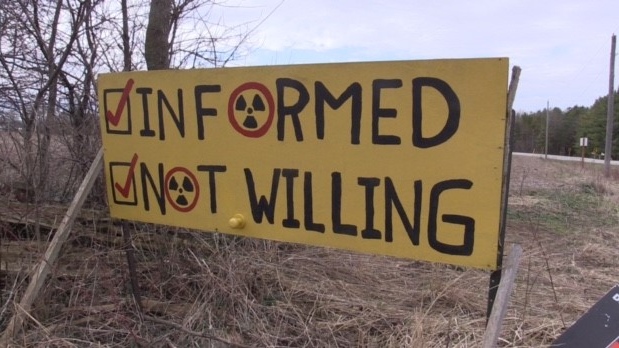South Bruce Council unanimously approves nuclear waste hosting agreement
On Wednesday, councillors with the Municipality of South Bruce voted on a nuclear waste hosting agreement that could change the course of their community forever.
South Bruce Council unanimously agreed to sign a hosting agreement with the Nuclear Waste Management Organization on Wednesday night.
With little deliberation, council members signed an agreement at a special council meeting that lays the ground work for what South Bruce would expect to see if they ended up being selected to host Canada’s first permanent nuclear waste facility.
“It’s something I feel like we’ve been waiting for, for a long time. It’s something we’ve been talking about for a long time, and it’s exciting to see what could potentially be in store,” said South Bruce resident, and founder of South Bruce Proud-Willing to Listen, Sheila Whytock.
The Municipality of South Bruce and the Nuclear Waste Management Organization (NWMO) have spent months working on a hosting agreement that would see the municipality of 5,800 residents, paid $418 million to host Canada’s first permanent nuclear waste facility.
The proposed Deep Geological Repository would house 5.6 million used nuclear fuel bundles, buried 600 metres underground in a series of tunnels spanning 1,500 acres of farmers fields, north of Teeswater.
The project is expected to span nearly 140 years, followed by decommissioning.
“To be honest, what difference does anybody’s thoughts make now? This entire process has included secret land deals and closed meetings. The council and the Nuclear Waste Management Organization have never sought our input. They completely ignore all of our concerns,” said Michelle Stein, South Bruce resident, and co-founder of No Nuclear Waste-Protect our Waterways.
Whytock is amongst those who are excited about the project’s potential. A project worth $26 billion, that would add more than 700 jobs to the community, and is forecast to nearly double South Bruce’s annual Gross Domestic Product to $680 million.
 Sign opposing plans to build a facility to house Canada’s used nuclear fuel near Teeswater, seen on April 4, 2024. (Scott Miller/CTV News London)
Sign opposing plans to build a facility to house Canada’s used nuclear fuel near Teeswater, seen on April 4, 2024. (Scott Miller/CTV News London)
“We’ve just recently seen the medical centre open up in town. It would be really nice to see some more helpful and encouraging things happen around here, and I think this might be a good vehicle to do it,” said Whytock.
Stein, who lives near the proposed project site, said she sees many red flags in the hosting agreement. Amongst them, a clause that states that if South Bruce declares itself a “willing host” to Canada’s most radioactive waste, they must not, “Engage in any action that could frustrate, delay or interfere with or stop the NWMO from proceeding with the project.”
“If this is such a great project for the community, why does it appear to be what looks like a gag clause in it,” saids Stein.
This fall, from Oct. 21 to 28, South Bruce residents will vote on whether they want to house Canada’s used nuclear fuel forever, or not.
As long as 50 per cent of residents cast a ballot, the vote will be binding.
“This is probably going to be town changing, probably no matter which way the vote goes, it’ll be town changing,” added Whytock.
CTVNews.ca Top Stories

DEVELOPING Slovakia's populist prime minister shot in assassination attempt, shocking Europe before elections
Slovakia's populist prime minister, Robert Fico, was shot multiple times and gravely wounded Wednesday after a political event in an attempted assassination that shocked the small country and reverberated across Europe.
Transport Canada's UFO 'lead' planned to meet with U.S. intel officials, called info requests a 'wild goose chase'
Canada's transportation department had a UFO 'lead' who tried to 'quell' media interest and planned to meet with U.S. intelligence officials.
'Very expensive lunch': Sask. driver handed a cell phone ticket for using points app in McDonald's drive-thru
A warning from a Saskatoon driver about using your fast-food app while in the drive-thru line — a trip to get some free lunch cost him a lot more than he bargained for.
'The Fly' has become notorious in France after a brazen escape. What's his criminal history?
A prisoner nicknamed “The Fly” has become notorious in France overnight after a daring and bloody escape from a prison convoy in Normandy that left two guards dead.
BREAKING Ontario's 'Crypto King' Aiden Pleterski arrested
Aiden Pleterski, the self-proclaimed 'crypto king' from Whitby, Ont., has been arrested in Durham Region after allegedly running a Ponzi scheme worth more than $40 million.
Barge hits a bridge in Texas, damaging the structure and causing an oil spill
A barge slammed into a bridge pillar in Galveston, Texas, on Wednesday, spilling oil into surrounding waters and closing the only road to a smaller and separate island that is home to a university, officials said. There were no immediate reports of injuries.
Person responsible for 1996 drugging of 'Titanic' crew likely not a local: Halifax police
Halifax Regional Police believe a non-resident could be responsible for the infamous drugging of numerous crew members of the 'Titanic' movie with a hallucinogenic in 1996.
Latest updates on the biggest wildfires burning in Canada
Thousands of people in Western Canada remain displaced from their homes as wildfires threaten their communities, triggering evacuation orders and alerts.
OPINION If you think you can’t focus for long, you’re right: Sandee LaMotte
Regaining your focus requires you to be mindful of how you are using technology -- a daunting task if you consider the average American spends at least 10 hours a day on screens.






























